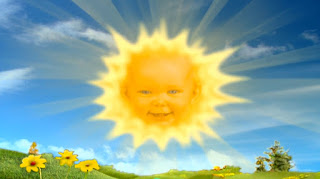Tuesday, May 8, 2018
Miles from Home
The historical figure of the town gossip often gives people a good chuckle. But the fact of the matter is the word of mouth method is something that cannot be duplicated. It is a priceless tool in advertising. Parents acting out the role of town gossip, so to speak, have proven to be extremely effective. Getting the parental stamp of approval can make all the difference for any product including a children's television show. Just like hearing words like engaging, funny, and thoughtful can be words that make a parent tune in to a show, hearing a show "is the most frighteningly disturbing show on television" can make them tune out. Words like weird and pointless can cause irreparable damage.
Creators Anne Wood and Andrew Davenport thought the preschool world and parents needed Teletubbies. So they pitched the show in the 90s to BBC. The story behind the concept is just as disjointed as the show and gives credibility to other children's educational show creators who were more calculated in their research. Unlike shows where extensive research had been done on how children learn, Teletubbies was a farcical idea based on a trip to the Smithsonian Institution in Washington D.C. and the observation of astronauts looking like toddlers in diapers or nappies as they are called in the U.K. Huh? That was only the beginning of the disconnect. The 4 main characters were first drawn up in a book and were given the name technological babies. The characters would not be animated though. They would be people dressed in costume. It worked with Big Bird. Hundreds of people would audition. Once chosen the actors would develop their character's unique style. Exploration in learning to appeal to children but recalling how they spoke as children was the target for how the creators wanted the creatures to behave. All throughout Teletubbies the ridiculous would continue even to the rabbits who were dying because their enlarged hearts from the inbreeding that had been done.
Anne Wood saw this all as glorious silliness but knowing that Andrew Davenport was inspired by Benny Hill, an actor and comedian best known for his risque' comedy television show makes Teletubbies look a little less innocent.
One parent observed that all the Teletubbies were named after slang names for genitalia. Tinky Winky, LaLa, Po, and Dipsy were not just cute, funny sounding names that a baby might be mispronouncing. This lends to another big issue many parents had. The Teletubbies didn't actually speak words. It was some form of gibberish that each character developed to include Mandarin because the woman who played Po spoke Mandarin better than English. A parent wanting help in teaching a child does not gain anything by allowing the child to hear what they already do naturally. Hearing gibberish does not help a child to formulate words and develop language skills. In so many instances Teletubbies was exactly what a parent did not want in a children's show.
The show opens with bright colors and a fat cheeked baby face as the face of the sun. A narrator is speaking of the landscape and introduces the little alien creatures dressed in their bright suits. From the beginning the issue with speech is clear. Even when the characters count they are unintelligible. Children repeat what they hear and they mispronounce words all the time. They need to hear what it is supposed to sound like not what it shouldn't sound like. If it weren't for the narrations there would be very few distinguishable words and certainly no full sentences. For a preschooler, the show would appeal to their most basic senses. Funny sounds emitting from creatures and machines, the bright colors of the countryside where the Teletubbies play and occasionally familiar actions or sounds that all babies learn like uh-oh or big hug are there but there is no depth. It is shallow and there is no real flow to the show to even give you a sense of the expected or predictable that children learn from except for the opening scenes, Objects or themes are sporadic like an umbrella being introduced and then a cloud that comes out but nothing actually connecting to draw conclusions for a child who is picking up on so much at this age.
Teletubbies was popular and sold millions of dollars in merchandise. Parents who allowed their children to watch the show reported how much their children loved the show. If we introduce the education versus entertainment argument here children will watch anything. One man who was at the dinner party that brought forth the Sesame Street concept said he had found his daughter watching those stripes that used to indicate off the air for television back when television went off the air. Children's educational television is supposed to link education with entertainment not substitute one for the other. If children aren't learning anything or if parents are concerned with digression this probably isn't the education you are looking for. The argument that we are learning all the time could make Teletubbies a choice for a parent who is just desperate for a moment of peace.
Subscribe to:
Post Comments (Atom)
Miles from Home
The historical figure of the town gossip often gives people a good chuckle. But the fact of the matter is the word of mouth method is so...

-
Its slogan was "to empower, to challenge, and build the self esteem of preschoolers all while making them laugh!" Targeted at a...
-
In 1995 the film Braveheart was released in theaters. Mel Gibson played the lead character, William Wallace, and also produced and directed ...
-
"If it ain't broke don't fix it" hangman on chalkboard Hangman the video game was released in 1980. The game i...







No comments:
Post a Comment